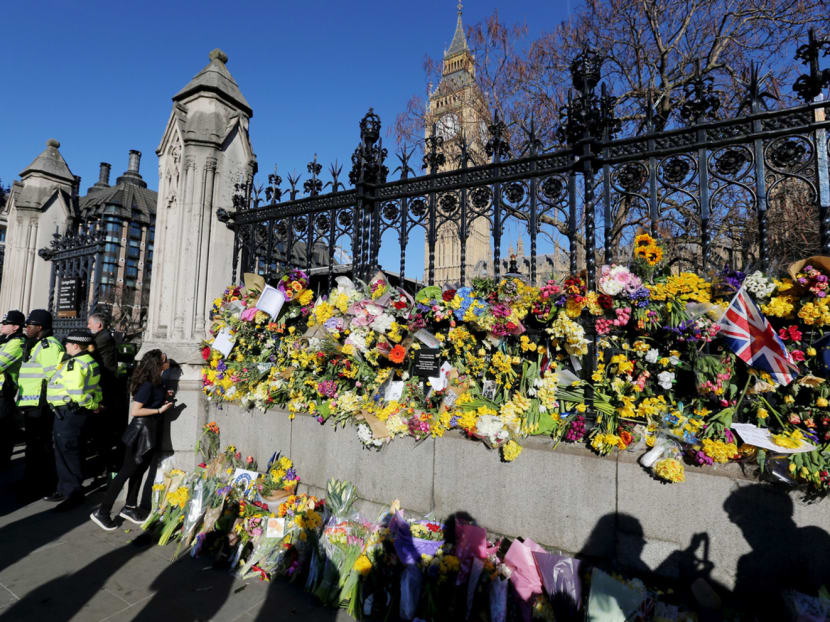Killer’s peaceful Northiam hometown shocked by events
NORTHIAM, ENGLAND — “This is supposed to be a quiet East Sussex village” declares a man in Will’s Cafe, the teahouse in what passes for the centre of bucolic Northiam.

Floral tributes on the wall surrounding the houses of Parliament on Saturday, following the attack in Westminster, in central London, Britain. Photo: Reuters
NORTHIAM, ENGLAND — “This is supposed to be a quiet East Sussex village” declares a man in Will’s Cafe, the teahouse in what passes for the centre of bucolic Northiam.
At the table beside him a mother and daughter stare in disbelief at tabloid photos of a radicalised Khalid Masood, a son of Northiam who, in a horrific act of terror, last week mowed down Londoners and tourists on Westminster Bridge before stabbing a police officer to death.
As a backdrop to international terrorism, it is hard to conjure a less likely setting.
On the road to historic Hastings, Northiam features thatched roofs, orchards, a 12th-century church and country lanes that wind through rolling hills. Yet Masood, then known as Adrian Russell Ajao, or simply “AJ” to many locals, spent what appears to have been a key part of his itinerant life here.
It is in Northiam that he assaulted a man with a knife, a crime that ended his marriage after he was sent him to prison, and where, many residents suspect, his conversion to Islam was hastened. But, before all that, Masood was known to many as a young man who drank in the local pubs and at times displayed a volatile temper — but nothing to indicate to them what was to come.
One man dismisses him as “a Herbert” — local slang for a loutish, wayward character. “He had a bit of a reputation for getting into a bit of trouble,” said Mr Adrian Baker, a long-time resident whose carpeting business is beside the pub car park where the knifing occurred.
Masood had been attacking a man’s car after what his lawyer described in court documents as a racial incident. Mr Piers Mott, a popular local, went to intervene and ended up being slashed in the cheek — a wound that required 20 stitches.
Then known as the Crown and Thistle, the pub later became the Muddy Duck and is now closed.
“It’s a lovely village, and people will be absolutely devastated to know that he had anything to do with the area,” said Mr Baker, still struggling to connect the past to the present.
On his table is a sampling of business cards from national media.
While in Northiam, Masood lived with his then-wife, Jane, and two daughters in a modest but comfortable-seeming brick house on Little Danson. It features skylight windows and a wooden gate. There is a cottage across the street and a pasture beside the house. A woman standing in the drive holds a small dog before closing the gate.
Masood and his then-wife sold cleaning chemicals and janitorial products from the house up until 2000, when they then rented a unit at a farm-turned-office park in nearby Bodian.
“They just seemed like a normal couple with two young children,” said Mr Tim Eastwood, owner of the Quarry Farm site.
After renting the site, Masood appeared to take less of a role in the business, Aaron Chemicals, than his wife, recalls Mr Eastwood.
Northiam is overwhelmingly white, and Masood appears to have stood out for being of mixed race.
“I only remember him because he wasn’t white English,” said one long-time resident, who insists he is not being racist, just stating a fact.
In addition to the Crown and Thistle, Masood also drank at another local pub, the Rose and Crown in Beckley.
“He was very intelligent — he used to sit and do the Telegraph crossword,” said Ms Alice Williams, who works behind the bar there. “He would discuss current affairs — or try to.”
The pub features bundles of dried hops — for which the local fields are famous — above the bar. A model Spitfire hangs from the ceiling, chasing a German fighter plane. It fills up late in the afternoon as the weekend approaches, with much talk of AJ, while the locals warily eye out-of-town journalists.
Like others, Ms Williams assumes Masood converted to Islam in prison.
Even though he was a regular, she remembered him as not being a particularly heavy drinker. He often arrived early and tended to take an interest in the newspapers she set on the bar. He was handsome, she thinks, and never caused any trouble.
Still, Ms Williams never warmed to him. “There was something odd about him,” she said, scrunching her face. “You can’t really put your finger on it.”
It may have been the reputation for volatility that accompanied Masood. Ms Williams recounts a tale — unconfirmed by the Financial Times — about the time Masood got into an altercation with another man and went to slash his tyres.
“He couldn’t work out which bloke’s car was which,” she said. “So he slashed everybody’s car.”
At Quarry Farm, Mr Eastwood still wonders — like many locals — how AJ became Khalid Masood, and how a violent terrorist was once part of the fabric of Northiam. “They’ve got to come from somewhere,” he said. FINANCIAL TIMES






